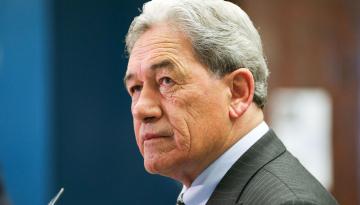Adapt or die is the message being sent from the Deputy Prime Minister to Māori communities, meaning that the hongi may never return.
Winston Peters says if we're not careful, it's a tradition that might not survive the COVID-19 pandemic.
The hongi has been surrounded by deep tradition for centuries. From the royal family, to prime ministers, to everyday New Zealanders, it's served as a symbolic show of unity between two people.
It's a gesture to say 'hi' that iwi advocate Pita Turei went weeks without doing.
"It was so refreshing after five weeks in lockdown to have a hongi with some that I think is safe," he says.
But outside of our bubble, there's a warning from Peters.
"One of the things you got to have regards for is if the hongi, in this circumstance, is ever going to come back again.
"I'm just putting it out there that the cultures that don't adapt, die."
He's referencing the 1918 Spanish flu pandemic where more Māori died than any other ethnicity.
Advisor on Māori and inter-cultural human rights Dr Rawiri Taonui says death rates for Māori were high during this pandemic.
"Death rates were about nine-times higher on latest estimates and Māori weren't supported in the same way as Pākehā communities."
But he added nothing has gotten rid of the hongi yet and COVID-19 won't have an impact either.
"Until we're clear of COVID and practicing social distancing, the hongi is not the best idea, but it will survive."
Under the new restrictions, the rules regarding the hongi is one the Prime Minister is leaving to iwi.
"I have complete support for that and that process," Jacinda Ardern says.
Turei says people will begin to hongi again in the future.
"As we progress, as we enlarge our bubbles, as we feel safe amongst bigger groups of people, we will hongi," he says.
But until then, people may have to call upon different greetings to hold in the place of the hongi until it's safe to acknowledge each other in a more traditional way.



